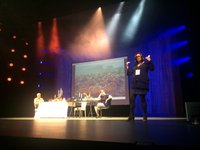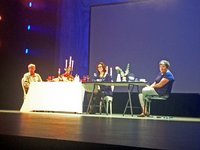Session 3 - Landscapes and Learning
Session 3 - Landscapes and Learning - Lone Wiggers, Amy Trubek and Paul Rozin
How do we learn to taste? How does out environment affect how things taste? What parts do our kitchens, our dinner tables, our cutlery etc. play in the way about which we taste things?
The public, the private buildings where we work, rest and play. Can we design towards a better taste?
To facilitate the dialogue on the subject, we invited architect, Lone Wiggers, to be the creative mediator, and professor of psychology, Paul Rozin, and associate professor of anthropology, Amy Trubek, to be the experts.
Lone Wiggers
How taste is influenced by the surrounding architecture. (From Wikipedia: Wiggers studied architecture at the Aarhus School of Architecture and the Ecole des Beaux Arts in Paris. After a year in London working with the Project Design Partnership (1989), she returned to Copenhagen where she joined Anna Maria Indrio (1990) before joining C. F. Møller Architects where she became a partner in 1997.
Wiggers has participated in a wide range of projects including residential housing, commercial buildings, schools, old people's homes, hospitals and museums. They cover both new constructions and the conversion and restoration of older buildings. She has served on many boards and committees, heading the architecture committee for the Danish Ministry of Culture's cultural canon and participating in the Special Building Survey Council for the Cultural Heritage Board since 2003.
Paul Rozin
Paul Rozin is a professor of psychology at the University of Pennsylvania. He holds a PhD in both biology and psychology from Harvard University. He is interested in how our biology and culture jointly determine human beliefs and attitudes about food. Recent research includes understanding why most people prefer natural to processed foods, how the sequence of foods in a meal determines the pleasure of memories for a meal, the role of disgust and other negative experience (e.g., mouth burning sensations) come to enhance the eating experiences, how one can maximize the pleasure and minimize the worry associated with eating through cross- cultural comparisons, particularly between France and the United States, the social and moral meanings of food in a cultural context, and ambivalent attitudes to consumption of animal products.
Paul Rozin has over 300 publications, was formerly an editor of the journal Appetite, and has been awarded the Distinguished Contribution Award of the American Psychological Association and the French Food Spirit Award.
Amy Trubek
Amy Trubek is the Faculty Director for the Food Systems Graduate Program and an Associate Professor in the Department of Nutrition and Food Sciences at the University of Vermont. She teaches courses in the contemporary food system, food and culture, qualitative research methods, and food history. Her research interests include the history of the culinary profession, globalization of the food supply, the relationship between taste and place, and cooking as a cultural practice. She has written the book: The Taste of Place: A Cultural Journey into Terroir (2009).





